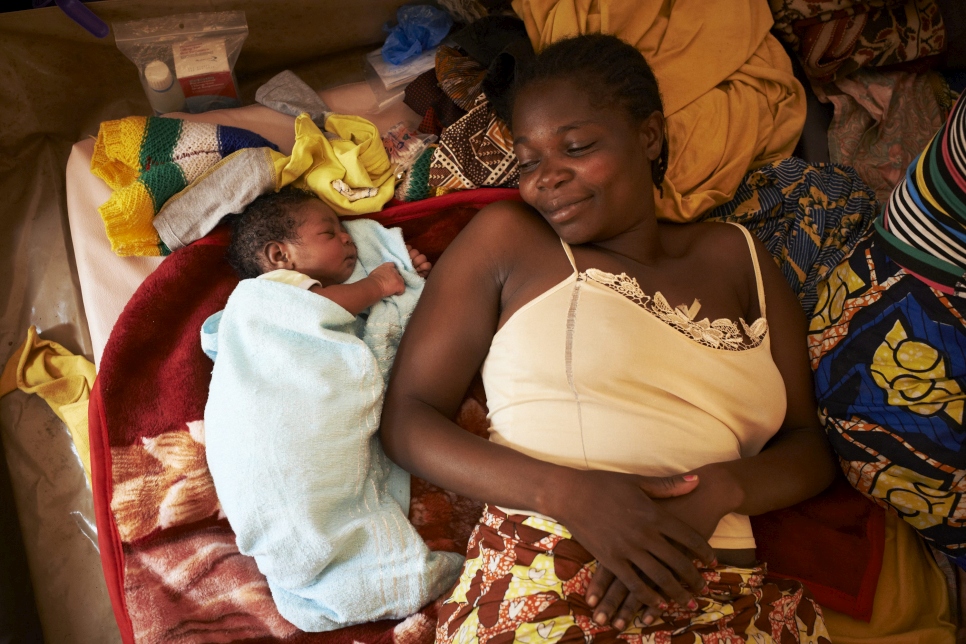Sexual and Reproductive Health
UNHCR places great importance on providing quality sexual and reproductive health services to refugees and other persons of concern. We work in close collaboration with host governments and partners to ensure refugees have access to such services and to improve the quality of available care. The Sustainable Development Goal 3 reflects concrete ambitions to improving sexual and reproductive health worldwide, including in humanitarian and refugee settings.
Why is Sexual and Reproductive Health (SRH) important?
Sexual and reproductive health implies that people are able to have a satisfying and safe sex life and have the capability to reproduce and the freedom to decide if, when, and how often to do so.
Access to quality sexual and reproductive health services plays a vital role in the well-being of a human being and is particularly relevant for people living in a situation of forced displacement. Refugees and other displaced people, who have access to sexual and reproductive health services, are better supported on their way to a healthier future and can benefit from the positive impact these services have on the family and the community at large.
It is important that services respect the various religious and cultural backgrounds and that the quality of care, as well as the range of services, conform to universally recognized human rights standards.
What does UNHCR do to improve reproductive health?
Within the UNHCR’s sexual and reproductive health strategy, we focus on a wide range of areas:
Maternal and newborn care
Maternal and newborn care is at the centre of UNHCR’s sexual and reproductive health work. Most maternal and newborn deaths occur during and immediately after labour and delivery. We strive to ensure that skilled birth attendants are available for all women in need, and as part of the effort to reduce maternal and newborn mortality, we provide guidance as well as support with the capacity building of health staff. In addition to relevant skills, birth attendants need to be supported by appropriate policies and essential supplies, including medicines. It is important that they can operate under applicable regulatory frameworks.
Additional sexual and reproductive health services and related health information complement this central effort:
- Access to ante and postnatal care
- Access to contraception and family planning
- Clinical management of rape survivors and intimate partner violence
- Management of abortion-related complications
- Prevention and treatment of fistula
- Screening and treatment of cervical cancer
Sexual and reproductive health for adolescents
Given the risks associated with adolescent pregnancy and their elevated risk of HIV and other sexually transmitted infections, we work towards improving access to sexual and reproductive health information and services for adolescents. UNHCR strives to ensure inclusiveness to all people in need of reproductive health services: women, men, adolescents, young people, LGBTI and people who sell sex.
Raising awareness
Knowledge about sexual and reproductive health services and access to adequate care have the power to improve the lives of people. Therefore, it is crucial to raise awareness for sexual and reproductive health and related services and inform people on the topic. Particularly as it encompasses a wide range of issues such as contraception methods, the consequences of sexual and intimate partner violence, female genital mutilation, transmission of HIV and other sexually transmitted infections.
In recent years, sexual and reproductive health care services to refugees in and out-of-camp as well as in urban settings have improved. However, UNHCR strives to drive these developments further and to extend access to reproductive health care to all people of concern.
Reproductive Health Strategies, Policies and Reports
- Policy brief on integrating SRH into health emergency and disaster risk management
- UNHCR Global Strategy for Public Health 2014 - 2018
- UNHCR - Public Health 2018, Annual Global Overview
External links
• Field Manual on Reproductive Health in Humanitarian Crisis (2018, multiple languages)
• Minimum Initial Service Package (MISP) Calculators
Maternal and Newborn Health: Operational Guidance and Monitoring Tools
- Operational Guidelines on improving Newborn Health in refugee operations
- Expansion of the 'Saving Maternal and Newborn Lives in Refugee Settings' Project: Summary of Baseline Assessment
Primer Documents
• High Impact Practice: Neonatal Resuscitation
Maternal and Newborn Death Audits
• World Health Organization's audits for neonatal deaths and stillbirths (external link)
Studies, Evaluations, Field Experience and Lessons Learned
- Inter-Agency Working Group on Reproductive Health in Crises - Training material (external link)
- Adolescent Sexual and Reproductive Health Programs in Humanitarian Settings: An In-depth Look at Family Planning Services (ENG) Also available in Arabic - French - Spanish
See more related research, articles and documents here
Maternal and Newborn Health: Training Resources II
Helping Mothers Survive: Bleeding after Birth
Helping Babies Survive:
• Helping babies breathe
• Essential care for small babies
• Essential care for every baby
Contraception and Family Planning
Training resources
Contraception and Family Planning in Refugee Settings Webinar: Part I
External resources
• WHO: Family Planning, A Global Handbook for Providers
• Women's Refugee Commission: Video on Family Planning
Adolescent Sexual and Reproductive Health
Operational guidance
Adolescent sexual and reproductive health in refugee situations: A practical guide to launching interventions for public health programmes
Brochures and Advocacy documents
Improving Adolescent Sexual and Reproductive Health Programs in Humanitarian Settings (external link)
Adolescent Sexual and Reproductive Health Programming in Goma, DRC
Case study - Annex - Report for Participants
Prevention, Response and Protection
Sexual and Gender-based violence and clinical management of rape
- Guidelines for Integrating Gender-Based Violence Interventions in Humanitarian Action
- Clinical management for rape survivors (revised edition)
Related guidance
Key External Links
- IAWG for Reproductive Health in Crisis Situations
- Women's Refugee Commission
- Save the Children - Resource Centre
- Care International - Sexual and Reproductive Health Rights
- Raise Initiative
- UNFPA
- UNICEF - Maternal and Newborn Health
- International Rescue Committee
- World Health Organization

